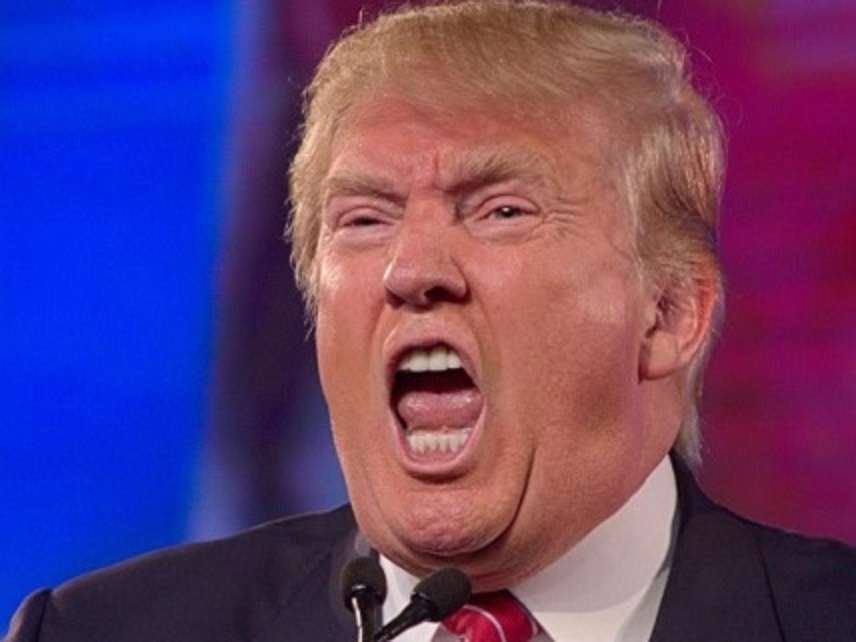I Don't Hate Trump Because He Is 'the Average American in Exaggerated Form.' I Dislike Him Because of His Policies and Temperament.
In the name of owning the libs, Yale's David Gelertner smears Americans as venal narcissists who can't agree to disagree.

Where were we? Oh yeah, talking about how the politicization of everyday life turns people into monsters. Politics is mostly zero sum, meaning one side wins and the other loses and just has to eat it. From a classical liberal perspective, this is one of the main reasons that politics should be squeezed into as small a corner as possible, reserved for those few things that require forced consensus (courts, law enforcement, taxes, some roads and schools). Most parts of life are more voluntary and open-ended, with exit being a prime option. If you don't like somebody's restaurant or store, you can just go elsewhere. If you don't like the reigning party's tax policy, you still have to pay up.
Over at The Wall Street Journal, Yale computer scientist David Gelernter inadvertently illustrates the bad that happens when politics oozes over everything like some spoiled sauce that fouls your barbecue and everything else on your plate. He does this during an attempt to mind-read the libs and divine "the real reason they hate Trump." Liberals don't hate Trump because of any policy he has espoused, any grotesque pussy-grabbing boast he has made, or any violent threat he has leveled, says Gelernter. No, he declares, the liberals hate the billionaire real estate developer because
he is a typical American—except exaggerated, because he has no constraints to cramp his style except the ones he himself invents….
The difference between citizens who hate Mr. Trump and those who can live with him—whether they love or merely tolerate him—comes down to their views of the typical American: the farmer, factory hand, auto mechanic, machinist, teamster, shop owner, clerk, software engineer, infantryman, truck driver, housewife. The leftist intellectuals I know say they dislike such people insofar as they tend to be conservative Republicans.
Gelernter further contends that part of the "leftist intellectual" agenda is "to do away with the jobs that sustain all those old-fashioned truck-driver-type people," which would be news to Bernie Sanders and all the AFL-CIO types who can't stfu about America's deindustrialization (which started in 1943) and the desperate need to bring back "good-paying" jobs like driving trucks. It is a peculiar and generally unconvincing smear to say that left-wingers hate the working class, which might explain why Gelernter doesn't provide much in the way of direct quotes.
There's another problem here: If Trump reflects the typical American, are we then all resigned to be venal narcissists and habitual bullshit artists? After stating several times that Trump is actually an "exaggerated" form of the typical American, he does ask:
Is it possible to hate Donald Trump but not the average American?…
What I see on the left is often plain, unconditional hatred of which the hater—God forgive him—is proud. It's discouraging, even disgusting. And it does mean, I believe, that the Trump-hater truly does hate the average American—male or female, black or white. Often he hates America, too.
I have written a lot about "Trump Derangement Syndrome" (TDS), which leads sufferers to talk about premature impeachment, invoking the 25th Amendment, doing away with the Electoral College, and more. What Gelernter's column drives home for me is that TDS is not simply a left-wing or #NeverTrump phenomenon. It pushes Trump fans—who as often as not will claim to not really, you know, support the guy except insofar as he's not Hillary or Bernie or Kamala or whomever—into their brand of lunacy and to demonize opposing points of view. If you're not for Trump, you're against him and you hate America. Wuh?
The most annoying (offensive?) thing about Gelernter's piece, like others of its type, is that it presumes there really are only two possibilities, pro-Trump and anti-Trump, that swamp everything else, even traditional partisanship. Worse still, the binary hinges not on issues of substance or policy but ultimately on issues of style. To wave away Trump's relentless cheapening of discourse—calling a porn actress to whom his personal lawyer paid $130,000 in hush money horseface is so fucked up on so many levels—is not really any different than being disgusted that he eats his steak well-done and with ketchup. Trump's m.o. is to make everything about himself.
The best response to Trump's general mode of discourse is to not take the bait and make everything about him and his personal preferences. There may be only two major parties in America, but the rest of the political spectrum is alive and well and the increasing number of us who are not represented by existing Republican and Democratic coalitions need to make our independent voices louder than ever. It bears repeating: Just 26 percent of Americans identify as Republican and just 27 percent of us identify as Democratic. Forty-four percent call ourselves independent.
Some of Trump's policies are good and worth defending; many are not. In the main (and this is very disappointing to partisans of either major party), he's probably more like his predecessors than not. The bigger, more important response to both Trump and his fanboys and haters is to refuse to make everything about politics. Because that way madness lies.


Show Comments (350)